Front brake mechanism is disc, ventilated, with a floating caliper and one working cylinder
The brake disc is cast iron, its minimum permissible thickness when worn is 17.8 mm.
The gap between the brake pads and the disc is maintained due to the elasticity of the rubber sealing ring installed in the groove of the wall of the working cylinder.
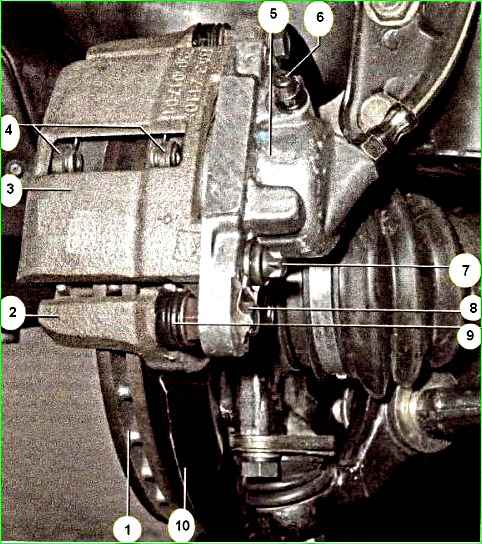
The floating front brake caliper includes a caliper and a wheel cylinder, tightened together with two screws.
The cylinder is attached to the guide pins installed in the holes of the pad guide with two bolts.
The brake pads are pressed by springs to the grooves of the pad guide.
A piston with a rectangular rubber sealing ring is installed in the cylinder.
Due to the elasticity of this ring, a constant optimal gap is maintained between the brake pads and the disc.
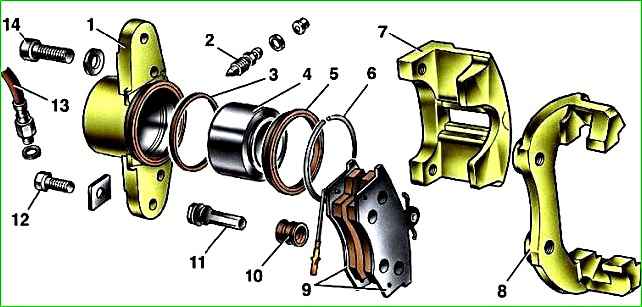
Replacing the front brake pads
The front brake pads must be replaced only as a set - all four pads.
Replacing the pads of only one brake mechanism can cause the car to pull to the side when braking.
If the fluid level in the brake hydraulic reservoir is at the MAX mark, then before installing new pads, use a syringe or rubber bulb to pump out some of the fluid from the reservoir so that when the piston is pressed into the working cylinder of the brake mechanism, the fluid does not flow out from under the reservoir cover.
Remove the front wheel.
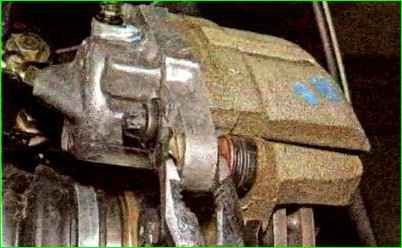
Using pliers, bend back the edges of the locking plate of the cylinder mounting bolt to the lower guide pin of the caliper.
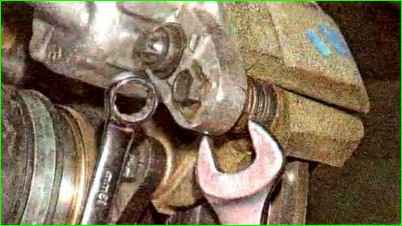
Using a 13 mm open-end wrench, loosen the bolt while holding the guide pin with the wrench 17.
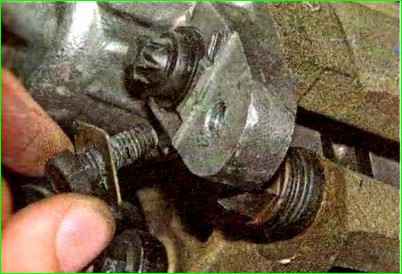
Remove the bolt with the locking plate.
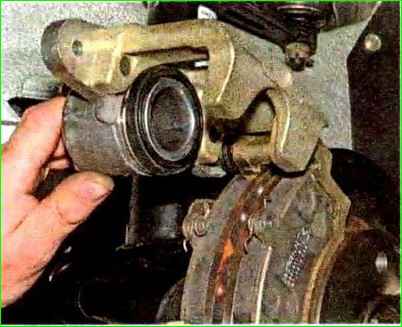
Lift the bracket
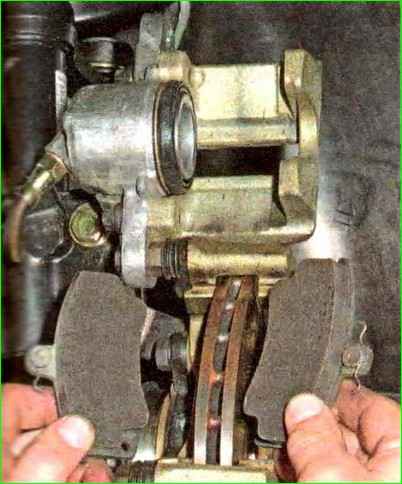
Remove the brake pads from their guide.
Clean the pad seats in the calipers and the pad guide from dirt and corrosion.
Before installing new pads, it is necessary to move the piston as far inside the cylinder as possible - this operation can be performed in different ways.
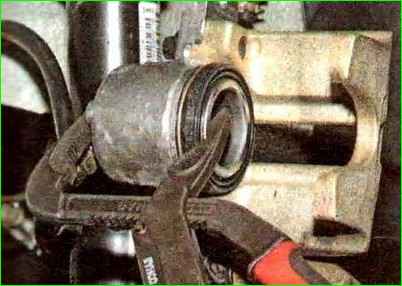
Using sliding pliers, push the piston into the cylinder.
With another method, install the inner pad in place and lower the bracket into the working position.
Having inserted a screwdriver or a tire iron through the caliper hole and resting it on the brake disc, move the bracket, pushing the piston yen in the cylinder
After replacing the pads, press the brake pedal several times to set the gaps between the pads and the discs.
Check the level in the reservoir.
Replacing the front wheel brake hose
Remove the front wheel and securely fix the car on the support stand. Turn the steering wheel all the way in the direction where the hose is being removed.
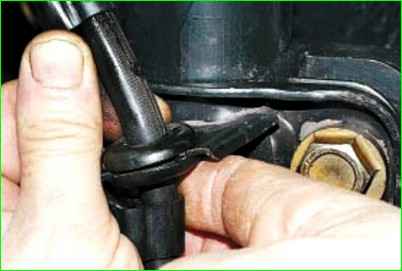
Remove the hose coupling from the shock absorber strut holder.
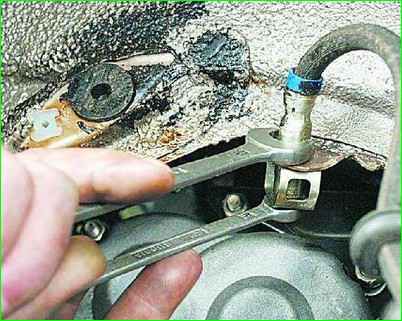
Holding the upper end of the hose with a 15 key, unscrew the brake pipe nipple with a special 10 key.
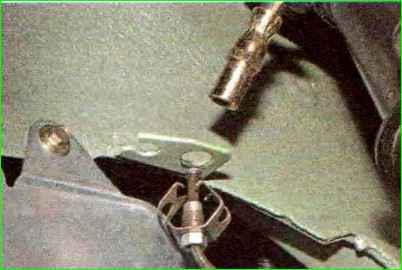
Remove the hose nipple from the body bracket hole.
To prevent brake fluid leakage, put the rubber cap of the brake bleed nipple on the brake pipe.
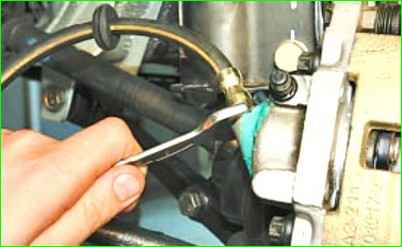
Use a 15 key to unscrew the lower end of the hose from the cylinder.
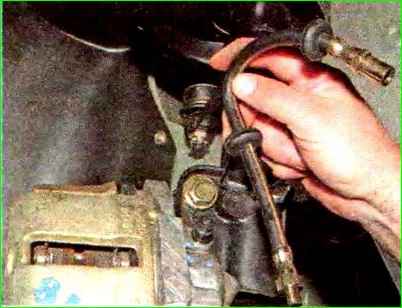
Remove the hose

The connection of the lower end of the hose to the cylinder is sealed with a copper washer.
Install the hose in the reverse order.
During installation, the hose should not be twisted.
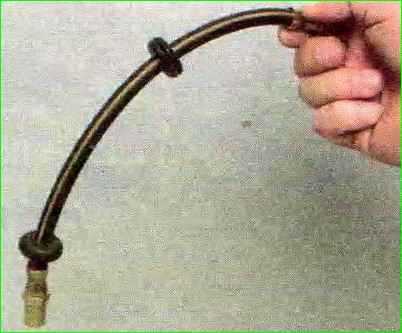
Two yellow lines are applied to the hose to control twisting. colors
After installing the hose, bleed the hydraulic drive of the brake system.
Replacing the front wheel brake cylinder
Remove the front wheel and securely fix the car on the support stand.
Turn the steering wheel until it stops in the direction on which the cylinder is being removed.
Remove the brake hose.
Unlock the bolts securing the cylinder to the guide pins of the bracket and unscrew the bolt securing the cylinder to the lower guide pin.
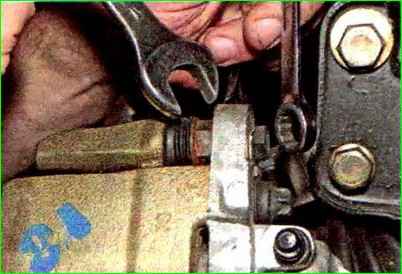
Using a 13 mm open-end wrench, loosen the bolt securing the cylinder to the upper guide pin, holding the pin from turning using the Allen key with a 17 mm wrench.
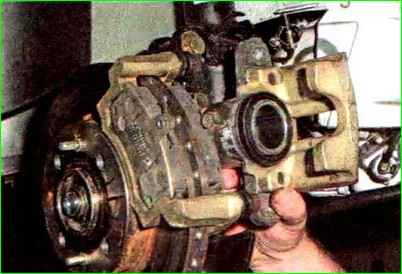
Remove the brake caliper
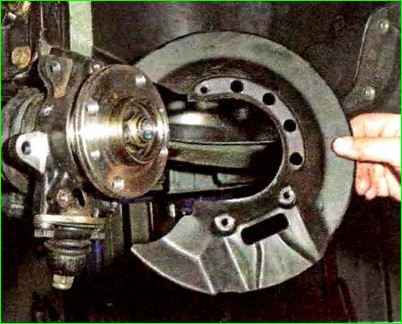
Install the shield and brake disc in the reverse order.





